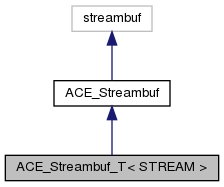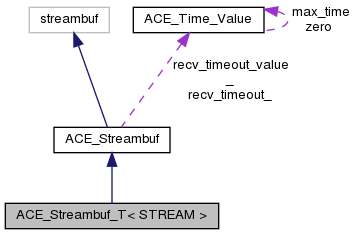#include <IOStream_T.h>
Inheritance diagram for ACE_Streambuf_T< STREAM >:

Collaboration diagram for ACE_Streambuf_T< STREAM >:

Public Member Functions | |
| ACE_Streambuf_T (STREAM *peer, u_int streambuf_size=ACE_STREAMBUF_SIZE, int io_mode=ios::in|ios::out) | |
| virtual ssize_t | send (char *buf, ssize_t len) |
| virtual ssize_t | recv (char *buf, ssize_t len, ACE_Time_Value *tv=0) |
| virtual ssize_t | recv (char *buf, ssize_t len, int flags, ACE_Time_Value *tv=0) |
| virtual ssize_t | recv_n (char *buf, ssize_t len, int flags=0, ACE_Time_Value *tv=0) |
 Public Member Functions inherited from ACE_Streambuf Public Member Functions inherited from ACE_Streambuf | |
| virtual | ~ACE_Streambuf (void) |
| ACE_Time_Value * | recv_timeout (ACE_Time_Value *tv=0) |
| Get the current Time_Value pointer and provide a new one. More... | |
| char * | reset_put_buffer (char *newBuffer=0, u_int _streambuf_size=0, u_int _pptr=0) |
| u_int | put_avail (void) |
| char * | reset_get_buffer (char *newBuffer=0, u_int _streambuf_size=0, u_int _gptr=0, u_int _egptr=0) |
| u_int | get_waiting (void) |
| u_int | get_avail (void) |
| u_int | streambuf_size (void) |
| Query the streambuf for the size of its buffers. More... | |
| u_char | timeout (void) |
Protected Member Functions | |
| virtual ACE_HANDLE | get_handle (void) |
 Protected Member Functions inherited from ACE_Streambuf Protected Member Functions inherited from ACE_Streambuf | |
| ACE_Streambuf (u_int streambuf_size, int io_mode) | |
| virtual int | sync (void) |
| virtual int | underflow (void) |
| virtual int | overflow (int c=EOF) |
| void | reset_base (void) |
| int | syncin (void) |
| int | syncout (void) |
| int | flushbuf (void) |
| int | fillbuf (void) |
| virtual int | get_one_byte (void) |
Protected Attributes | |
| STREAM * | peer_ |
| This will be our ACE_SOCK_Stream or similar object. More... | |
 Protected Attributes inherited from ACE_Streambuf Protected Attributes inherited from ACE_Streambuf | |
| char * | eback_saved_ |
| char * | gptr_saved_ |
| char * | egptr_saved_ |
| char * | pbase_saved_ |
| char * | pptr_saved_ |
| char * | epptr_saved_ |
| u_char | cur_mode_ |
| const u_char | get_mode_ |
| const u_char | put_mode_ |
| int | mode_ |
| const u_int | streambuf_size_ |
| u_char | timeout_ |
| Did we take an error because of an IO operation timeout? More... | |
| ACE_Time_Value | recv_timeout_value_ |
| ACE_Time_Value * | recv_timeout_ |
Constructor & Destructor Documentation
◆ ACE_Streambuf_T()
template<class STREAM >
| ACE_Streambuf_T< STREAM >::ACE_Streambuf_T | ( | STREAM * | peer, |
| u_int | streambuf_size = ACE_STREAMBUF_SIZE, |
||
| int | io_mode = ios::in | ios::out |
||
| ) |
We will be given a STREAM by the iostream object which creates us. See the ACE_IOStream template for how that works. Like other streambuf objects, we can be input-only, output-only or both.
Member Function Documentation
◆ get_handle()
template<class STREAM >
|
protectedvirtual |
Reimplemented from ACE_Streambuf.
◆ recv() [1/2]
template<class STREAM >
|
virtual |
Implements ACE_Streambuf.
◆ recv() [2/2]
template<class STREAM >
|
virtual |
Implements ACE_Streambuf.
◆ recv_n()
template<class STREAM >
|
virtual |
Implements ACE_Streambuf.
◆ send()
template<class STREAM >
|
virtual |
Stream connections and "unconnected connections" (ie – datagrams) need to work just a little differently. We derive custom Streambuf objects for them and provide these functions at that time.
Implements ACE_Streambuf.
Member Data Documentation
◆ peer_
template<class STREAM >
|
protected |
This will be our ACE_SOCK_Stream or similar object.
The documentation for this class was generated from the following files:
 1.8.14
1.8.14